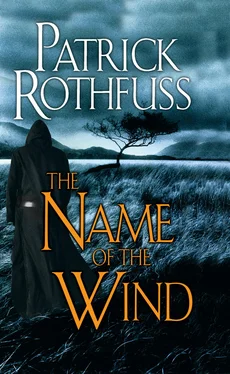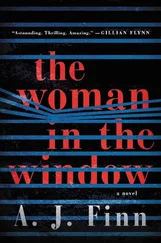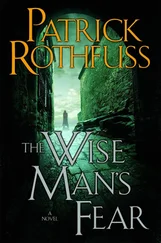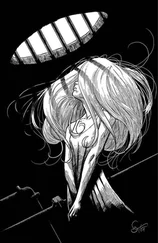She rolled her eyes, her expression softening. “Well, in this culture a healthy tip makes a fine apology.” She handed Wil his drink and turned to leave, resting her empty tray on one hip.
We watched her go, each of us thinking our own private thoughts.
“I noticed he had his rings back,” I mentioned eventually.
“He played a brilliant round of bassat last night,” Simmon said. “Made six doublings in a row and cracked the bank.”
“To Sovoy,” Wilem held up his tin mug. “May his luck keep him in classes and us in drinks.” We toasted and drank, then Wilem brought us back to the matter at hand. “That leaves you with Kilvin and Elxa Dal.” He held up two fingers.
“What about Elodin?” I interrupted.
They both gave me blank looks. “What about him?” Simmon asked.
“He seems nice enough,” I said. “Couldn’t I study under him?”
Simmon burst out laughing. Wilem gave a rare grin. “What?” I demanded.
“Elodin doesn’t teach anything,” Sim explained. “Except maybe advanced oddness.”
“He has to teach something,” I protested. “He’s a master, isn’t he?”
“Sim is right. Elodin is cramped.” Wil tapped the side of his head.
“Cracked,” Simmon corrected.
“Cracked,” Wil repeated.
“He does seem a little . . . strange,” I said.
“You do pick things up quick,” Wilem said dryly. “No wonder you made it into the Arcanum at such a tender age.”
“Ease off, Wil, he’s hardly been here a span.” Simmon turned to me. “Elodin used to be Chancellor about five years ago.”
“Elodin?” I couldn’t hide my incredulity. “But he’s so young and . . .” I trailed off, not wanting to say the first word that came to my mind: crazy .
Simmon finished my sentence. “. . . brilliant. And not that young if you consider that he was admitted to the University when he was barely fourteen.” Simmon looked at me. “He was a full arcanist by eighteen. Then he stayed around as a giller for a few years.”
“Giller?” I interrupted.
“Gillers are arcanists who stay at the University,” Wil said. “They do a lot of the teaching. You know Cammar in the Fishery?”
I shook my head.
“Tall, scarred.” Wil gestured to one side of his face. “Only one eye?”
I nodded somberly. Cammar was hard to miss. The left side of his face was a web of scars that radiated out, leaving bald strips running through his black hair and beard. He wore a patch over the hollow of his left eye. He was a walking object lesson about how dangerous work in the Fishery could be. “I’ve seen him around. He’s a full arcanist?”
Wil nodded. “He’s Kilvin’s second in command. He teaches sygaldry to the newer students.”
Sim cleared his throat. “As I was saying, Elodin was the youngest ever admitted, youngest to make arcanist, and youngest to be Chancellor.”
“Even so,” I said. “You have to admit he’s a little odd to be Chancellor.”
“Not back then,” Simmon said soberly. “That was before it happened.”
When nothing more was forthcoming I prompted, “It?”
Wil shrugged. “Something. They do not speak on it. They locked him in the Crockery until he got most of his marbles back.”
“I don’t like thinking about it,” Simmon said, shifting uncomfortably in his chair. “I mean, a couple students go crazy every term, right?” He looked at Wilem. “Remember Slyhth?” Wil nodded somberly. “It might happen to any of us.”
There was a moment of silence as the two of them sipped their drinks, not looking at anything in particular. I wanted to ask for specifics, but I could tell that it was a touchy subject.
“Anyway,” Sim said in a low voice. “I heard they didn’t let him out of the Crockery. I heard he escaped.”
“No arcanist worth his salt can be kept in a cell,” I said. “That’s not surprising.”
“Have you ever been there?” Simmon asked. “It’s built to keep arcanists locked up. All meshed stone. Wards on the doors and windows.” He shook his head. “I can’t imagine how someone could get out, even one of the masters.”
“All this is beside the path,” Wilem said firmly, bringing us back to task. “Kilvin has welcomed you to the Fishery. Impressing him will be your best chance at making Re’lar.” He looked back and forth between us. “Agreed?”
“Agreed,” Simmon said.
I nodded, but the wheels in my head were spinning. I was thinking about Taborlin the Great, who knew the names of all things. I thought about the stories Skarpi had told back in Tarbean. He hadn’t mentioned arcanists, only namers.
And I thought of Elodin, Master Namer, and how I might approach him.
CHAPTER FORTY-FIVE
Interlude—Some Tavern Tale
At a gesture from Kvothe, Chronicler wiped off the nib of his pen and shook out his hand. Bast gave a great, seated stretch, his arms arching over the back of the chair.
“I’d almost forgotten how quickly it all happened,” Kvothe mused. “Those were probably the first stories anyone ever told about me.”
“They’re still telling them at the University,” Chronicler said. “I’ve heard three different versions of the class you taught. Your whipping, too. Is that when they started calling you Kvothe the Bloodless?”
Kvothe nodded. “Possibly.”
“If we’re asking questions, Reshi,” Bast said sheepishly, “I was wondering why you didn’t go looking for Skarpi?”
“What could I have done, Bast? Smeared my face with lampblack and staged a daring midnight rescue?” Kvothe gave a brief humorless laugh. “They’d taken him in on heresy . All I could do was hope he truly had friends in the church.”
Kvothe drew a deep breath and sighed. “But the simplest reason is the least satisfying one, I suppose. The truth is this: I wasn’t living in a story.”
“I don’t think I’m understanding you, Reshi,” Bast said, puzzled.
“Think of all the stories you’ve heard, Bast. You have a young boy, the hero. His parents are killed. He sets out for vengeance. What happens next?”
Bast hesitated, his expression puzzled. Chronicler answered the question instead. “He finds help. A clever talking squirrel. An old drunken swordsman. A mad hermit in the woods. That sort of thing.”
Kvothe nodded. “Exactly! He finds the mad hermit in the woods, proves himself worthy, and learns the names of all things, just like Taborlin the Great. Then with these powerful magics at his beck and call, what does he do?”
Chronicler shrugged. “He finds the villains and kills them.”
“Of course,” Kvothe said grandly. “Clean, quick, and easy as lying. We know how it ends practically before it starts. That’s why stories appeal to us. They give us the clarity and simplicity our real lives lack.”
Kvothe leaned forward. “If this were some tavern tale, all half-truth and senseless adventure, I would tell you how my time at the University was spent with a purity of dedication. I would learn the ever-changing name of the wind, ride out, and gain my revenge against the Chandrian.” Kvothe snapped his fingers sharply. “Simple as that.
“But while that might make for an entertaining story, it would not be the truth. The truth is this. I had mourned my parents’ death for three years, and the pain of it had faded to a dull ache.”
Kvothe made a conciliatory gesture with one hand, and smiled a tight smile. “I won’t lie to you. There were times late at night when I lay sleepless and desperately alone in my narrow bunk in the Mews, times when I was choked with a sorrow so endless and empty that I thought it would smother me.
“There were times when I would see a mother holding her child, or a father laughing with his son, and anger would flare up in me, hot and furious with the memory of blood and the smell of burning hair.”
Читать дальше











